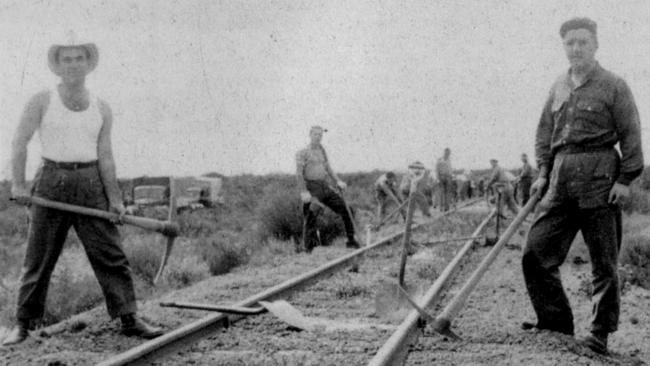No welcome mat laid out for early European arrivals
The first Italian migrants struggled but still learned to deeply love their new home.

This Australia Day, as in most years, there is a preoccupation with the national character.
This year there is a feel-good story about how generous and resilient the Australian national character is, as evidenced by the response to the fires.
However, the truth is that Australians are no better or worse than any other people, and our history is not a singularly heroic story. Yet it is a compelling story of sheer survival; the survival of the descendants of that first European incursion and the survival of the indigenous descendants of the first peoples.
But what of the survival of the millions who came here from non-Anglophone countries and helped build Australia? They had no ties to the British imperial foundations, so how do they and their descendants feel about Australia Day? Immigrants from vastly diverse backgrounds have made up as much of our national character as the English-speaking majority, but there is ignorance about their historic struggles. Their perspective is usually overlooked because there is a complacent assumption that before World War II they were an insignificant minority.
Think again. I am a child of multicultural Australia before that concept became fashionable.
My sixth-generation Australian mother is descended from an English convict who prospered and Irish free settlers, but my father was the child of Italian peasants who immigrated before World War II.
The older generation, unlike this generation of skilled immigrants, were part of the muscle that built Australia. They worked in every menial job they could, from cutting cane to hauling bricks and outback road work.
Their mental health was often shattered; isolation and loneliness were their lot. My grandfather saved for years before he could bring out his wife and children. My dad was six months old when his father left Italy; nine years old when he saw him again.
On Australia Day we now embrace multiculturalism as part of our national character but we should remember that, before multiculturalism became a fashionable trope, we weren’t always so embracing.
My parents got married under a cloud of suspicion of my father’s “foreign” family, despite the foreign family having become Australian citizens and one of my uncles having been sent to fight in New Guinea. However, neither of my grandparents learned to speak English and consequently, despite their citizenship, they lived in fear of internment during the war.
My grandfather kept his naturalisation papers on him all the time because even citizens who could not speak English were sometimes interned. This astoundingly stupid policy mostly locked up farmers, especially in NSW’s Riverina area, who were growing food for the army and civilian population. It was also appallingly cruel. Their wives and children were left alone and young boys, including my dad, were rostered after school to work on both their own farms and neighbouring farms where the men were interned.
It is a part of the Australian story that has been largely wiped from our feel-good history. Mia Spizzica, author of Hidden Lives: War, Internment and Australia’s Italians, says: “Italian-Australians were arguably the largest group of almost 5000 Italian civilians incarcerated in any Allied nation, yet this remains insignificant in Australia’s wartime story.” It also left resentment among many older Italian-Australians.
However, despite this history, the interesting thing is that even though it was so hard for them, indeed perhaps because it was so hard for them, today they, their children and their grandchildren are very pro-Australia, mostly anti-illegal immigration and usually supportive of Australia Day.
Why is this? It is not so strange that the immigrant population in general is overwhelmingly against arrivals by boat. Aside from the bureaucratic difficulties of coming to Australia, the passages of non-British immigrants to Australia were not subsidised, as were the British “ten-pound Pom” immigrants, who benefited from that scheme as recently as 1982.
As for any help when immigrants did arrive, even during the influx in the 1950s, there was little assistance, but in my father’s and grandfather’s day there was none.
However, what is strange is that non-British immigrants are supportive of the day we became part of the British Empire.
As a young soldier during the period not long after the rise of the Fascists in Italy, my grandfather was advised by his superior that if he couldn’t go to the US or Canada, to go somewhere with an English-speaking culture and a stable British-style government and laws. That left Australia.
Hence his belief that if he could prove his citizenship by possession of documents, the authorities couldn’t intern him. If they did, he thought he would have some recourse to the law. Inability to speak English during the war was a powerful obstacle to justice, but he believed the law would prevail. This is not the sentimental idea of fairness or the Aussie fair go.
Older immigrants, having been called “dago” and “wog” for years, probably would laugh at that idea.
This is about more than that. It is about the way a society is governed and organised under the law. Immigrants have great faith in that.
The period during the war when many Italian-Australians were carted off to internment was a period of great stress and resentment that lingered. But, despite no compensation, no apology and little historical acknowledgment, those people and their descendants did not succumb to victimhood. They simply got on with their lives and gradually they absorbed an Australian identity that has been strengthened in every generation.
Our Australian identity is complex. In my case it claims descent from a 15-year-old boy transportee and a 23-year-old Italian peasant — both tough specimens.
We should venerate both sides of our heritage. But we are particularly grateful to our old nonno for choosing Australia.



